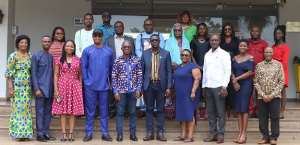Twenty-five civil society organizations including the West Africa Network of Journalists for Security and Development, the Care-Love Charity Foundation, and Youth for Peace and Security in Africa, are undergoing advocacy skills development to campaign for a review of Ghana’s outdated arms control laws.
The other CSOs who are all affiliates of the West Africa Action Network on Small Arms (WAANSA-Ghana) are the Jatikay Center, the West Africa Center for Violent Extremism, the Association of Ghanaian Women and Child Welfare, and the Centre for Democratic Development Ghana.
The rest are the Foundation for Security and Development in Africa, the Orphans and Widows Association, the Security Warehouse, West Africa Lead, the Nurture Nature Foundation, the Centre for Rural Women in Peace, Security, and Development, Greater Accra Youth Network, BADEC, and Nutifafa Foundation.
The CSOs capacity and advocacy skills development at Abokobi near Accra aimed at empowering the core group on the Saving Lives Entity (SALIENT) Project.
The objectives of the session are to design a long-term communication plan, formulate a comprehensive lobbying and advocacy strategy for legal reforms, and release a statement demanding immediate action.
Ghana is the third African country to benefit from the first phase of the SALIENT Trust fund, which is being spearheaded by the United Nations Office for Disarmament Affairs (UNODA) and the United Nations Development Programme (UNDP).
Topics being discussed include the SALIENT Project, the status of arms governance, gaps and arms-related issues in Ghana and ECOWAS, international arms control best practices and frameworks, including the ECOWAS Convention, the Arms Trade Treaty (ATT), the Programme of Action on Small Arms and Light Weapons (PoA), and the roles of CSOs.
Others are provisions of the Current Arms Bill, CSO advocacy, and lobbying within the SALIENT Fund Project, Development of Advocacy and Communication Plan, critical issues for lobbying in the New Arms Bill, Challenges to Lobby Action and Stakeholder Mapping for Lobby Action, Lobby Strategies and Skills, Elements, and Preparation for a Practically Successful Lobby Event.
Dr. Edward Fokuoh Ampratwum, PhD, Governance Specialist and Governance and Inclusive Growth Lead at the United Nations Development Programme (UNDP), has noted that the proliferation of small arms and light weapons fuels civil wars, organized criminal violence, insurgency, and terrorist activities, posing significant obstacles to sustainable security and development.
Dr. Ampratwum emphasized the need for urgent action to address the proliferation of small arms and light weapons in Ghana in the context of the deteriorating security situation in the Sahel and northern borders of some Gulf of Guinea countries.
He urged civil society organizations to step up their advocacy efforts and lobby duty bearers to urgently consider the passage of robust legislation aimed at improving small arms control in Ghana.
He emphasized the critical role of civil society in promoting peace, security, and development in the country.
Dr. Ampratwum provided a historical perspective on Ghana’s arms control regime, highlighting the Arms and Ammunition Act of 1962, the Arms and Ammunition Decree of 1972, and the consolidated Arms and Ammunition Act of 1972.
He emphasized Ghana’s obligation to domesticate the provisions of the Convention, which has not been done since 2006.
Mr. Ken Kenny The WAANSA-Ghana President emphasized the need for CSOs to work together to put pressure on Parliament, policymakers, and stakeholders to take urgent action to address the proliferation of small arms and light weapons in Ghana.
He emphasized the need for a comprehensive and robust legislative framework to regulate and control small arms and light weapons in the country.
The project aimed to address armed violence and illicit small arms and light weapons trafficking, emphasizing a comprehensive approach to sustainable security and development.
The project is also a collaborative effort of various UN agencies, including UNDP and the United Nations Office on Drugs and Crime (UNODC), to support the Ghanaian government and non-state actors such as the National Commission for Small Arms.
Recent global developments underscore the urgent need to develop a robust strategy to safeguard sustainable development gains and address the menace of small arms proliferation.
The project seeks to upscale efforts towards the passage of the Small Arms Commission Bill into law to provide the necessary tools and mechanisms to effectively regulate the possession and transfer of small arms and light weapons.
The SALIENT project is being implemented in Ghana by WAANSA-Ghana, the National Commission on Small Arms and Light Weapons, and the Kofi Annan International Peacekeeping and Training Centre.
SALIENT is integrated into multisectoral platforms and initiatives that have been created over the past 20 years by UNDP, UNODA, and other UN bodies. These initiatives highlight the necessity of multisectoral methods for combating armed violence as well as the control of small arms and ammunition.
Additionally, the project aims to support ongoing efforts by UN and non-UN organizations engaged in border control, law enforcement, and crime prevention.

